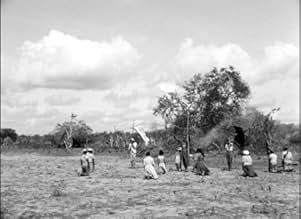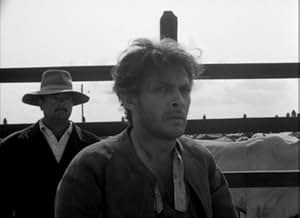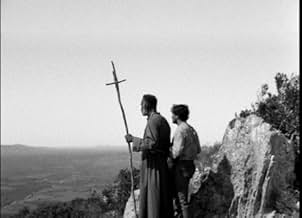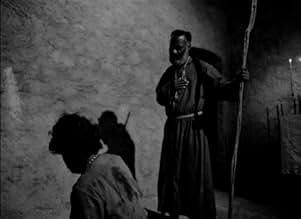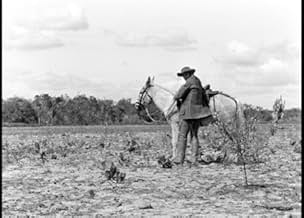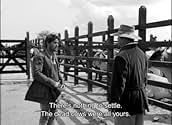IMDb-BEWERTUNG
7,2/10
5902
IHRE BEWERTUNG
Füge eine Handlung in deiner Sprache hinzuAfter killing his employer when he tries to cheat him out of his payment, a man becomes an outlaw and starts following a self-proclaimed saint.After killing his employer when he tries to cheat him out of his payment, a man becomes an outlaw and starts following a self-proclaimed saint.After killing his employer when he tries to cheat him out of his payment, a man becomes an outlaw and starts following a self-proclaimed saint.
- Regie
- Drehbuch
- Hauptbesetzung
- Auszeichnungen
- 1 Nominierung insgesamt
Milton Rosa
- Moraes
- (as Milton Roda)
Marrom
- Cego Júlio
- (Nicht genannt)
Empfohlene Bewertungen
Glauber Rocha just 25 when he made this and I was only seven year younger although I had never watched this before but maybe then I might have loved it more but now I find it rather difficult. Clearly I can see that it is an amazing idea but punishing to have done this in Monte Santo, Bahia this drought-ridden hinterland of the North-East of Brazil. Manoel has killed his cheating ranch owner and then his mother dies and he and his wife go off to follow a self proclaimed saint. It is slow, and Christ like but also much violence. Although there is even more to come. It is difficult watching Manoel climb up the mountain on his knees and with a 20 kilo stone on his head and apparently the actor decided he should really do it. I found that during this part I thought of Bunuel with Simon of the Desert (1965) and his man on a column. Towards the end with the last few people moving between each other and I thought of Michelangelo Antonioni. Now and again I wondered about Jodorowsky's El Topo (1970), however this film is on its own and even if it is a bit slow it is surely worth a look.
At just 25, Brazilian director Glauber Rocha directed Black God, White Devil, now considered one of the most important pictures to ever come out of Brazil, and a key entry into the Cinema Novo movement. Combining elements of Sergio Leone, Italian neo-realism, and Soviet propaganda such as the work of Sergei Eisenstein, Rocha created a brutal, grainy world inhabited by suicidal religious fanatics, wandering hit men, and psychopathic bandits. From the opening shots of rotting animal corpses and the endless Brazilian sertão, Rocha portrays a grim social realism, one of the key aspects of Cinema Novo.
Ranch-hand Manuel (Geraldo Del Rey) lives in poverty with his wife Rosa (Yona Magalhaes). Fed up with his situation, he goes into town to sell his stock, only to have his boss try to cheat him out of his money, so Manuel kills him with a machete. Fleeing the authorities, he falls in with maniacal preacher Sebastiao (Lidio Silva), who leads Manuel, Rosa and his other followers on a killing spree. Circumstances lead to Manuel leaving the cause, and joining up with famous bandit Corisco (Othon Bastos), who also leads the couple on an orgy of meaningless violence and thievery. But shadowy gun-for-hire Antonio das Mortes (Mauricio do Valle), having been paid by the church and a poltician, is hot on Corisco's tail.
The film very much reminded me of Cormac McCarthy's astounding novel Blood Meridian, where the sheer brutality of the violence played as a metaphor for a society gone sour and a world intent of self-destruction. Like Blood Meridian's The Kid, Manuel and Rosa follow blindly to whichever cause they see a glimmer of hope in. They fail to see the lunacy of Sebastiao's behaviour, and it's only at the point where he stabs a baby in the heart that their eyes seem to be opened, only for them to shack up with the gibbering Corisco, a man who speaks like a poet but doesn't seem to be able to comprehend his own existence. It is at this point, about two-thirds in, that the film seems to lose momentum and becomes somewhat of an unfathomable mess.
But it isn't just the social-political ponderings that make Black God, White Devil so memorable, it also has style in abundance. The camera-work is shaky and urgent at times, full of character close-ups from awkward angles, but it also uses fast editing reminiscent of Eisenstein's greatest works. Similar to Battleship Potemkin's (1925) Odessa steps sequence, the Monte Santo chapel massacre at the hands of Antonio das Mortes is simply electrifying. It is das Mortes' presence that leads to the moments that evoke the work of Sergio Leone, wrapping the shady anti-hero in moody atmosphere like Clint Eastwood's Man With No Name. It's a dangerous mixture of conflicting styles that works beautifully, making the film beautiful and cool, occasionally horrifying, and undoubtedly important. It's just a shame it doesn't manage to keep up with the absolutely astonishing opening two-thirds.
Ranch-hand Manuel (Geraldo Del Rey) lives in poverty with his wife Rosa (Yona Magalhaes). Fed up with his situation, he goes into town to sell his stock, only to have his boss try to cheat him out of his money, so Manuel kills him with a machete. Fleeing the authorities, he falls in with maniacal preacher Sebastiao (Lidio Silva), who leads Manuel, Rosa and his other followers on a killing spree. Circumstances lead to Manuel leaving the cause, and joining up with famous bandit Corisco (Othon Bastos), who also leads the couple on an orgy of meaningless violence and thievery. But shadowy gun-for-hire Antonio das Mortes (Mauricio do Valle), having been paid by the church and a poltician, is hot on Corisco's tail.
The film very much reminded me of Cormac McCarthy's astounding novel Blood Meridian, where the sheer brutality of the violence played as a metaphor for a society gone sour and a world intent of self-destruction. Like Blood Meridian's The Kid, Manuel and Rosa follow blindly to whichever cause they see a glimmer of hope in. They fail to see the lunacy of Sebastiao's behaviour, and it's only at the point where he stabs a baby in the heart that their eyes seem to be opened, only for them to shack up with the gibbering Corisco, a man who speaks like a poet but doesn't seem to be able to comprehend his own existence. It is at this point, about two-thirds in, that the film seems to lose momentum and becomes somewhat of an unfathomable mess.
But it isn't just the social-political ponderings that make Black God, White Devil so memorable, it also has style in abundance. The camera-work is shaky and urgent at times, full of character close-ups from awkward angles, but it also uses fast editing reminiscent of Eisenstein's greatest works. Similar to Battleship Potemkin's (1925) Odessa steps sequence, the Monte Santo chapel massacre at the hands of Antonio das Mortes is simply electrifying. It is das Mortes' presence that leads to the moments that evoke the work of Sergio Leone, wrapping the shady anti-hero in moody atmosphere like Clint Eastwood's Man With No Name. It's a dangerous mixture of conflicting styles that works beautifully, making the film beautiful and cool, occasionally horrifying, and undoubtedly important. It's just a shame it doesn't manage to keep up with the absolutely astonishing opening two-thirds.
I saw this film on the premise of that it according to critics is the "best Brazilian film of all times". Critics are way too generous to this young auteur influenced by Eisenstein and other masters, mixing genres and styles but only achieving an amateurish, confused, pretentious and quite tasteless work. It is messy, low-budget and is overall not worth watching despite a handful of nice shots and moments. In an accompanying interview to the film, the director Rocha, with Marxist rhetoric, blame European colonists for Latin America's economic problems and justifies the movie's content as "the aesthetics of hunger". To me, more than anything else, it shows the madness of religion and cults and how they attract people in desperation.
Deus e o Diabo na Terra do Sol isn't just a good Brazilian movie. This is an actual masterpiece, compared to the big ones in the history of cinema. It's not a boring and too regional film, but deals with universal aspects of human nature, such as blind devotion, love, hate, and all kinds of misery. Glauber Rocha, with only 22 years, made a mix of Eisenstein, Italian neo-realism and nouvelle-vague, under a background of cordel literature (our pulp fictions). The Mauricio do Valle character, Antonio das Mortes, is fundamentally a European western anti-hero, and certainly inspired Leone, Corbucci and others in the development of their scripts. The soundtrack, with Villa Lobbos and Rocha&Ricardo songs, matches perfectly with the dry landscape of the Brazilian Northeast. In short, Deus e o Diabo na Terra do Sol must be known. If you have open mind and like great cinema, and not just the popcorn no-brain north-American blockbusters, try this one.
This film begins wonderfully, brilliantly shot and keenly acted- but right as you're sure it's coming to a close, the music suddenly runs uptempo and the narrator says the equivalent of "Wait, there's more!" and the second segment of the film destroys any credibility the first might have established. The director's portrayal of the desert's harshness lends logically to the lunacy of the characters- but Rosa's actions in the second half seem completely unmotivated, as if the actors ran out of script and just start making things up out of boredom in front of the camera. Laudable attempts at Eisenstein-style multiple-repeat editing are a good idea but using them to cover the low-budget nature of the action scenes is not. Overall worth seeing, but I must warn you that I fell asleep towards the end.
Wusstest du schon
- WissenswertesIn the scene where we see Manuel (Geraldo Del Rey) carrying a huge stone over his head while climbing Monte Santo on his knees, Del Rey insisted on carrying a real stone that weighted over 20 kilos - something that really worried director Glauber Rocha. After the shooting, Del Rey had to take 2 days off, as he wasn't in condition to show up.
- VerbindungenEdited into A Edição do Nordeste (2023)
- SoundtracksManuel e Rosa
Written by Glauber Rocha & Sérgio Ricardo
Top-Auswahl
Melde dich zum Bewerten an und greife auf die Watchlist für personalisierte Empfehlungen zu.
- How long is Black God, White Devil?Powered by Alexa
Details
- Erscheinungsdatum
- Herkunftsland
- Offizieller Standort
- Sprache
- Auch bekannt als
- Black God, White Devil
- Drehorte
- Produktionsfirmen
- Weitere beteiligte Unternehmen bei IMDbPro anzeigen
Box Office
- Bruttoertrag in den USA und Kanada
- 7.826 $
- Eröffnungswochenende in den USA und in Kanada
- 3.200 $
- 19. Nov. 2023
- Weltweiter Bruttoertrag
- 7.826 $
- Laufzeit2 Stunden
- Farbe
- Sound-Mix
- Seitenverhältnis
- 1.37 : 1
Zu dieser Seite beitragen
Bearbeitung vorschlagen oder fehlenden Inhalt hinzufügen

Oberste Lücke
What is the French language plot outline for Gott und der Teufel im Lande der Sonne (1964)?
Antwort

